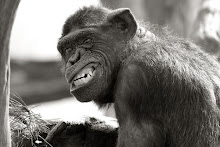Planet of the Apes (1968)
I recently bought a copy of the original Planet of the Apes on DVD and the satirical look at humanity is just about as fresh as ever, particularly considering the religious right's war on science.
The look and special effects of the movie may be somewhat dated (the 2001 version by Tim Burton has much more real looking make up and costuming) and it's a little distracting to see how little the mouths move as the apes are talking, but the story is just as enjoyable and compelling as it ever was, as are the little twists of story and direction that make the movie watching experience so much fun.
The story starts as a crew of astronauts, led by George Taylor (Charleton Heston), land on a planet's wasteland and begin to explore their brave new world. At first heartened by the discovery of a primative human culture, they are shocked to learn that the world's masters are anthropomorphized apes who hunt humans for sport. Taylor is captured and, while his throat heals from an injury, learns a little about the society. Gorillas are violent soldiers, chimps are pacifist technicians and scholars, and orangutans are priests/leaders. He attracts the curiosity of one chimp animal psychologist, Zira (Kim Hunter) , due to his displays of intelligence and they begin to form a bond both intellectual and emotional.
When Taylor is sufficiently healed and reveals that he can, in fact, speak intelligently, he becomes an object of fear as well as study. There are some particularly nice scenes with Dr. Zaius, a powerful orangutan, and debates about the nature of man and truth. In the end, both Dr. Zaius and Taylor prove something of their points because it becomes clear that Dr. Zaius has some fear of humanity and is covering up the truth, yet it also becomes clear that there are reasons why the cover-up exists as it does.
Some of the dialogue might come across as being a bit hackneyed in this cynical day in age and I doubt Heston really believed in the things he said (being a conservative in a pro-counterculture movie), but he still acts with conviction. Kudos for being such a professional.
I love the movie and give it an A-.

